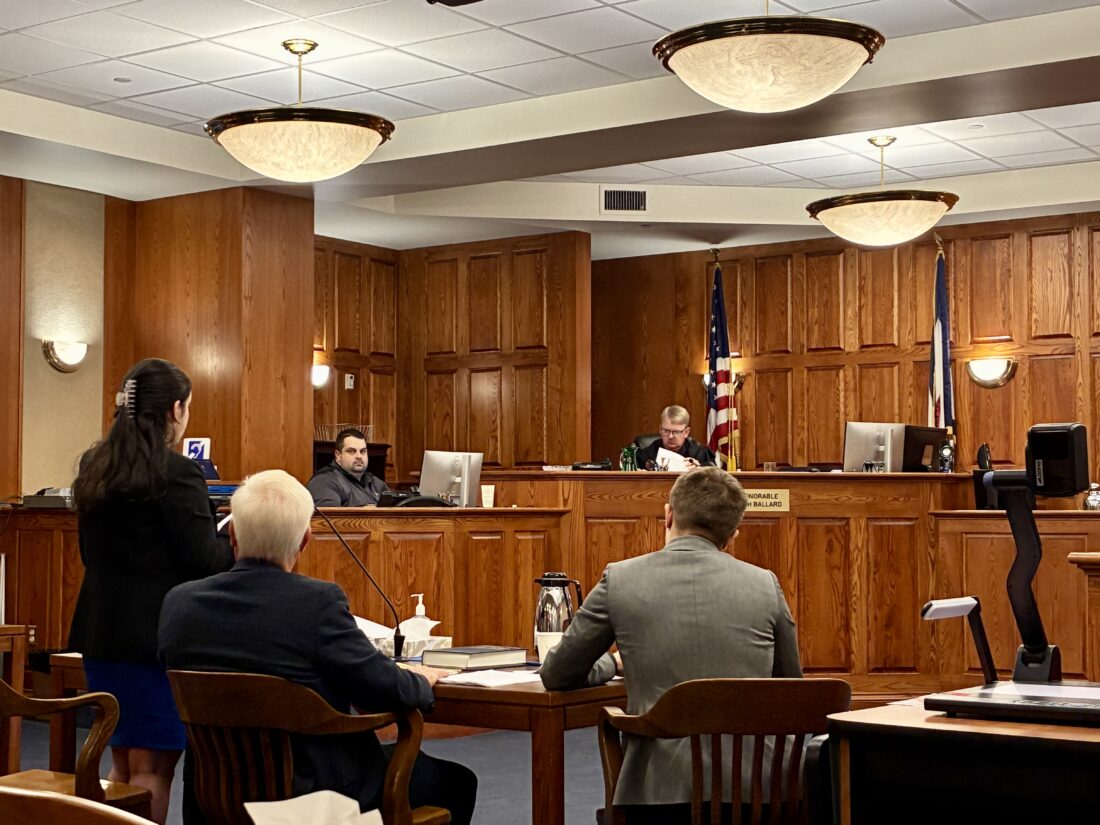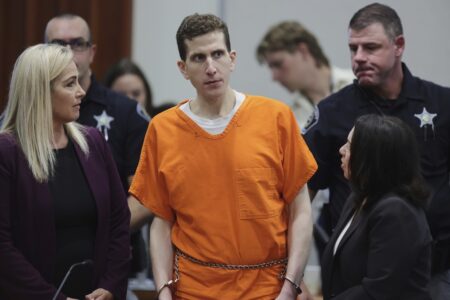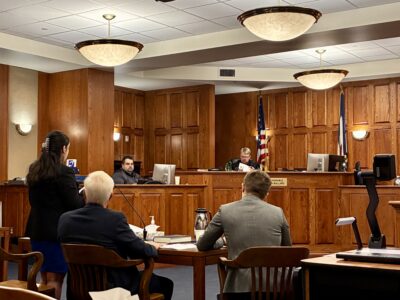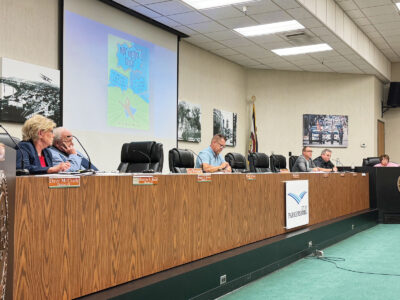Kanawha County judge dismisses case to block Morrisey’s religious vaccine exemption order
Raleigh County case ordering counties to follow order on docket Thursday

ACLU of West Virginia Legal Director Aubrey Sparks, left, argues against a motion to dismiss a lawsuit Wednesday brought by the ACLU-WV and Mountain State Justice before 8th Judicial Circuit Court Judge Kenneth Ballard. (Photo by Steven Allen Adams)
CHARLESTON – The question of whether to require public and private school students to be vaccinated is now before a Raleigh County court after a Kanawha County judge dismissed the case of two parents seeking to require West Virginia health officials to follow state law. In a hearing Wednesday afternoon at the Kanawha County Judicial Building in downtown Charleston, 8th Judicial Circuit Court Judge Kenneth Ballard granted a motion filed by the West Virginia Department of Health to dismiss a request for a writ of mandamus filed in May by the ACLU of West Virginia and Mountain State Justice. The groups filed the lawsuit on behalf of Kanawha and Cabell County parents asking the courts to order state health officials to follow State Code 16-3-1, requiring children attending school to show proof of immunization for diphtheria, pertussis, tetanus, polio, measles, mumps, rubella, varicella and hepatitis B unless proof of a medical exemption can be shown. The lawsuit was in response to a Jan. 14 executive order issued by Morrisey citing the 2023 Equal Protection for Religion Act to allow for religious and conscientious objections to the state’s school vaccination mandates. The parents were also asking the courts to rule that Morrisey’s executive order was unlawful or invalid. Ballard dismissed the lawsuit after a two-hour hearing Wednesday afternoon, agreeing with the state’s attorneys that the ACLU-WV and Mountain State Justice did not follow state law themselves, which requires that state agencies and officials be given a 30-day notice before a lawsuit can be filed against them. “I think I’m jurisdictionally barred,” Ballard said from the bench. “The petitioners failed to satisfy West Virginia Code … which requires either a 30-day notice or a pleading of injunctive relief.” “First skirmish of a longer fight, but the ultimate outcome –whether resolved via litigation or a change in statute– is not in doubt,” Morrisey said in a social media post Wednesday following the outcome in court. “West Virginia is a radical outlier when it comes to onerous vaccine mandates — one of only (five) states in the nation without a statutorily-based, religious exemption.” State code allows for the 30-day notice to be waived when a party seeks a preliminary or permanent injunction to prevent the state from taking a certain action. But a writ of mandamus, if granted, requires the state to take a certain action: In this case, requiring the Department of Health to follow the state school-age vaccine law instead of the governor’s executive order. Morrisey’s executive order required the commissioner for the Bureau of Public Health/state health officer to establish a process for parents/guardians to request religious or philosophical exemptions to school-age vaccines, only requiring a request in writing. During her argument to the court in favor of the motion to dismiss, state Principal Deputy Solicitor General Holly Wilson said the parents had no standing to bring the case and they were seeking to place their interpretation of the law over the clear language of the statute. “What they really mean … is that they think they have a right to have their official enforce the law as they interpret it,” Wilson said. “You cannot use a mandamus action to create the right you’re trying to enforce. You can’t reverse engineer things.” Speaking after Wednesday’s hearing, ACLU-WV Legal Director Aubrey Sparks said it was too soon to say whether the legal team for the parents would file a 30-day notice and bring a second writ of mandamus lawsuit. “It’s an open question about what our next steps are, because I know that there’s a lot of other lawsuits pending on this issue, and we want to understand what happens in those,” she said. “But we do feel fundamentally that what the state is doing here is unlawful, but then – more concerningly – what the state has argued in this case is so profoundly unconstitutional that we should all be concerned.” An effort to codify Morrisey’s executive order failed in March when the West Virginia House of Delegates voted down a heavily amended Senate Bill 460, which would have allowed for a religious vaccine exemption for public schools while allowing private and parochial schools to set their own vaccine requirements. But Morrisey’s vaccine executive order remains in effect. The West Virginia Board of Education voted unanimously on June 11 for a motion requiring State Superintendent of Schools Michele Blatt to issue guidance to county school systems that they follow the current compulsory school vaccination law that does not permit religious exemptions for students. A Raleigh County parent filed a lawsuit in June on behalf of her child seeking a preliminary and permanent injunction against the state Board of Education, Blatt and the Raleigh County Board of Education. That lawsuit – which Morrisey has publicly supported – seeks to block the state board’s vaccine directive. “We do have an (executive order), based upon our state’s religious freedom law that is very strong and must be given meaning,” Morrisey said on social media. “Sadly, the state school board is ignoring this important law — they are overreaching and need to be stopped!” Morrisey and state Department of Health Cabinet Secretary Arvin Singh, represented by Attorney General J.B. McCuskey, filed a motion Monday seeking to provide a friend-of-the-court brief in the Raleigh County case arguing the legality of the executive order. “The proposed brief would assist the Court by further explaining how Executive Order 7-25 properly brought the school vaccine law and the EPRA (Equal Protection for Religion Act) into harmony, how the Department of Health implemented the order, and how the Board of Education’s categorical bar of vaccine exemptions for religious students is inconsistent with the State’s vaccine law, violates the EPRA, and unconstitutionally burdens free religious exercise,” wrote Wilson. A hearing in that case is scheduled for 10 a.m. today before 14th Judicial Circuit Judge Michael Froble. Attorneys for the parent are seeking a ruling on their motion by Friday. Sparks said the ACLU-WV has not involved itself in other lawsuits. “We have not filed anything, and I can’t speak as to whether or not we’re planning to file something, but I do think that it’s a deeply related issue that gets to the same core of who’s the correct decision-maker here,” Sparks said. According to a database maintained by the state Department of Education, 13 out of 55 county school systems begin their school year on Aug. 14: Barbour, Berkeley, Boone, Calhoun, Fayette, Gilmer, Hampshire, Lewis, Lincoln, Morgan, Ritchie, Roane, Uphsur and Wirt counties. Doddridge and Summers counties begin Aug. 13, while Pleasants County starts Aug. 12 and Cabell County Aug. 11. As of Wednesday, the state Bureau for Public Health has received 309 religious exemption requests for the upcoming school year, with 288 requests already processed with notification letters sent to parents/guardians and the student’s school or child care provider, according to a spokesperson for the Department of Health. Steven Allen Adams can be reached at sadams@newsandsentinel.com.




